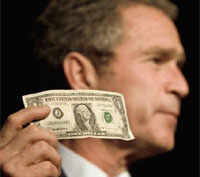Bush predicts strong US dollar and robust economy
US President George W. Bush predicted in an interview Tuesday that the battered US dollar will get stronger because the US economy is robust.

"If people would look at the strength of our economy, they'd realize why, you know, I believe that the dollar will be stronger," Bush told the Fox Business Network.
"We have a strong dollar policy, and it's important for the world to know that. We also believe it's important for the market to set the value of the dollar relative to other currencies," the president said.
Bush cited low US inflation figures, modest interest rates, job growth, and gross domestic product growth and declared "the underpinnings are strong."
Asked whether he was satisfied with current exchange rates, Bush replied: "I am satisfied with the fact that we have a strong dollar policy and know that the market ought to be setting the exchange rate."
The dollar has been weakening against the fast-appreciating euro in recent months. In European trade Tuesday, the euro climbed to 1.4599 dollars, compared to its rate of 1.2806 dollars a year ago, AFP reports.
As Pravda.Ru previously reported US economy may retake leadership in a couple of years.
The fast-inflating economies of China, emerging Asia and Eastern Europe will be reminded globalisation cuts both ways. Jobs can flow from Shanghai to Los Angeles.
US exports reached a record $140bn in September, powered by Prairie grains, Texas cotton, semiconductors, chemicals, even cars. "I put the US economy up against any in the world in terms of competitiveness - that's a fact," said US Treasury Secretary Hank Paulson.
The US trade deficit has fallen to $56.5bn, down 14pc in a year. The current account deficit has slimmed from 7pc of GDP in early 2005 to 5.5pc, and is narrowing fast. Bad, but no longer catastrophic.
This is the first fruit of devaluation, enough to hobble Airbus and prompt French president Nicolas Sarkozy to warn of "economic war" on Capitol Hill last week.
French industrial output fell 1.1pc in September. It is becoming ever clearer that Europe will suffer as much from America's housing crash as America itself, and perhaps more so. This is what happened after the US dotcom crash. Flexible economies rebound faster.
The world has barely begun to feel the impact of the latest dollar slide - to $2.11 against sterling, $1.47 against the euro, and 75.45 on the dollar index, the lowest since the Bretton Woods system collapsed. This will make itself felt over the next two years in countless ways, whether it be Volkswagen switching plant to the US, or the repatriation of software offices from India , where IT salaries have rocketed to $18 an hour.
Click here to read the full text of the article.
Source: agencies
Subscribe to Pravda.Ru Telegram channel, Facebook, RSS!




